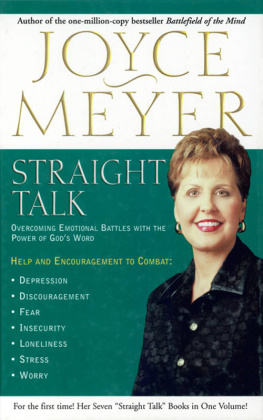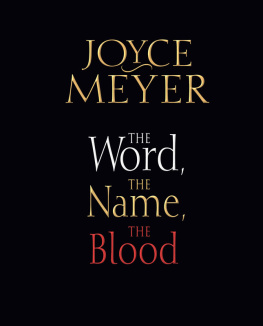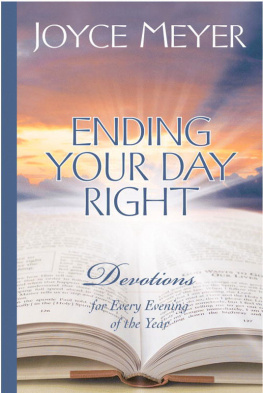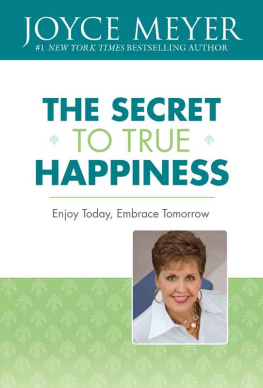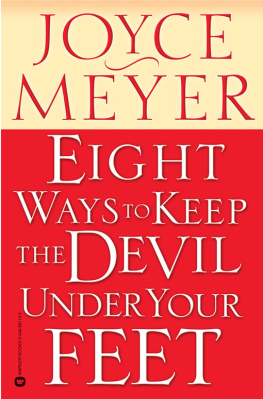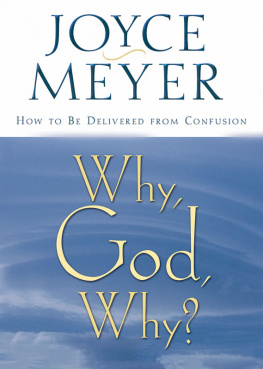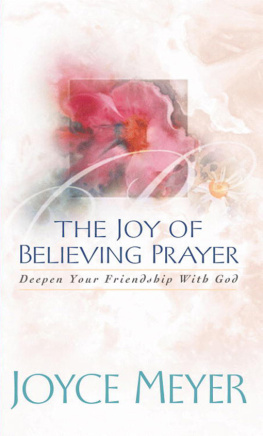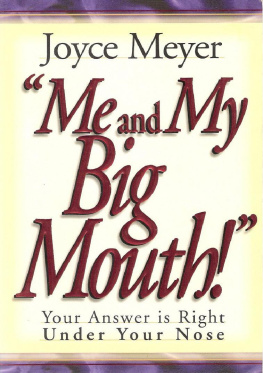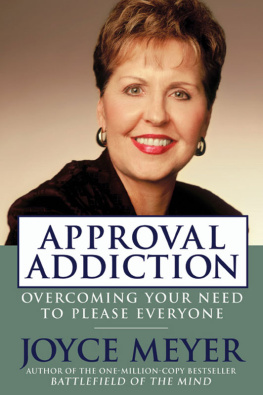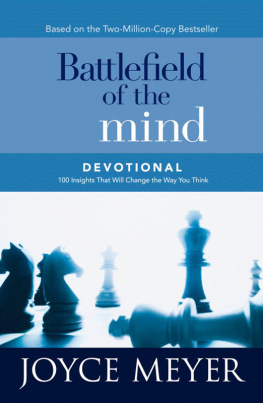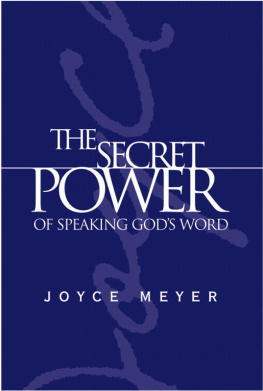Joyce Meyer - The Answer to Anxiety
Here you can read online Joyce Meyer - The Answer to Anxiety full text of the book (entire story) in english for free. Download pdf and epub, get meaning, cover and reviews about this ebook. year: 2023, publisher: FaithWords, genre: Religion. Description of the work, (preface) as well as reviews are available. Best literature library LitArk.com created for fans of good reading and offers a wide selection of genres:
Romance novel
Science fiction
Adventure
Detective
Science
History
Home and family
Prose
Art
Politics
Computer
Non-fiction
Religion
Business
Children
Humor
Choose a favorite category and find really read worthwhile books. Enjoy immersion in the world of imagination, feel the emotions of the characters or learn something new for yourself, make an fascinating discovery.

- Book:The Answer to Anxiety
- Author:
- Publisher:FaithWords
- Genre:
- Year:2023
- Rating:3 / 5
- Favourites:Add to favourites
- Your mark:
- 60
- 1
- 2
- 3
- 4
- 5
The Answer to Anxiety: summary, description and annotation
We offer to read an annotation, description, summary or preface (depends on what the author of the book "The Answer to Anxiety" wrote himself). If you haven't found the necessary information about the book — write in the comments, we will try to find it.
The Answer to Anxiety — read online for free the complete book (whole text) full work
Below is the text of the book, divided by pages. System saving the place of the last page read, allows you to conveniently read the book "The Answer to Anxiety" online for free, without having to search again every time where you left off. Put a bookmark, and you can go to the page where you finished reading at any time.
Font size:
Interval:
Bookmark:
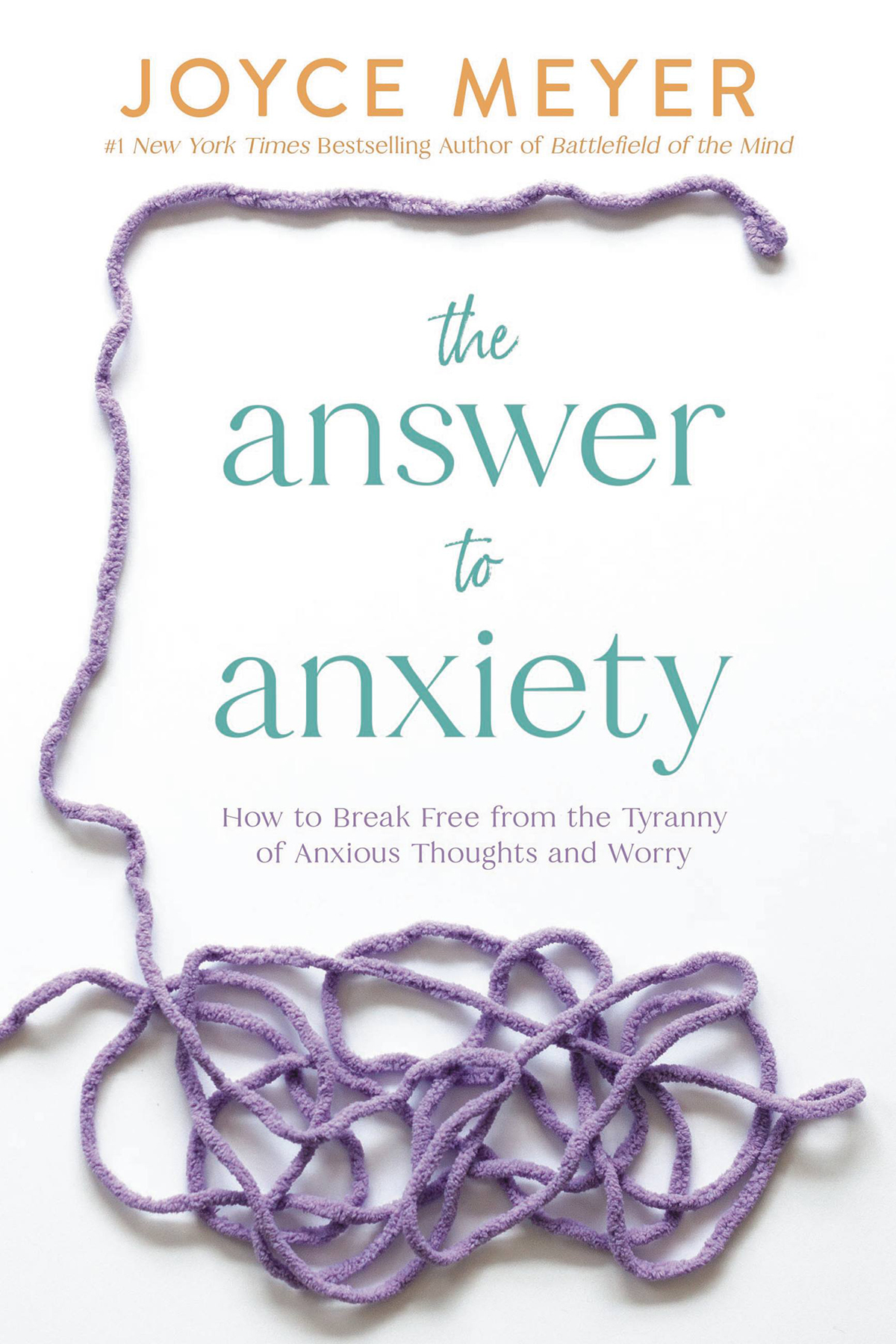
I would like to thank Beth Clark for her excellent editorial work on this book.
Copyright 2023 by Joyce Meyer
Cover copyright 2023 by Hachette Book Group, Inc.
Hachette Book Group supports the right to free expression and the value of copyright. The purpose of copyright is to encourage writers and artists to produce the creative works that enrich our culture.
The scanning, uploading, and distribution of this book without permission is a theft of the authors intellectual property. If you would like permission to use material from the book (other than for review purposes), please contact permissions@hbgusa.com. Thank you for your support of the authors rights.
FaithWords
Hachette Book Group
1290 Avenue of the Americas, New York, NY 10104
faithwords.com
twitter.com/faithwords
First Edition: February 2023
FaithWords is a division of Hachette Book Group, Inc. The FaithWords name and logo are trademarks of Hachette Book Group, Inc.
The publisher is not responsible for websites (or their content) that are not owned by the publisher.
The Hachette Speakers Bureau provides a wide range of authors for speaking events. To find out more, go to www.hachettespeakersbureau.com or call (866) 376-6591.
Library of Congress Cataloging-in-Publication Data has been applied for.
ISBNs: 978-1-5460-2917-5 (hardcover), 978-1-5460-0304-5 (large print), 978-1-5460-2918-2 (ebook)
E3-20221207-JV-NF-ORI
Anxiety and worry are common human responses to stressful situations. We all feel anxious, worried, or concerned at times. But if anxiety becomes severe enough, it may require medical attention, which could include some type of professional counseling and/or medication. Situations that typically require such intervention include long-term stress or unbalanced hormones or neurotransmitters. When therapy or medication is warranted, we should not feel ashamed of getting the help we need.
According to the Anxiety and Depression Association of America, Anxiety disorders are the most common and pervasive mental disorders in the United States.:
Anxiety disorders affect 40 million adults in the United States (18.1 percent of the population) every year. Anxiety disorders are the most common mental illnesses in the United States.
Only 36.9 percent of those suffering from anxiety receive treatment, even though it is highly treatable.
Risk factors including genetics, brain chemistry, personality, and life events contribute to the development of anxiety disorders.
Anxiety disorders and depression are linked. Almost half of people diagnosed with depression are also diagnosed with an anxiety disorder.
Women are twice as likely to be affected by generalized anxiety disorder as men.
Stress and anxiety affect everyone at one time or another.
Stress is a response to a threat in a certain situation. Anxiety is a reaction to that stress.
Anxiety disorders affect 25.1 percent of teenagers. Teens with untreated anxiety disorders are at higher risk for poor school performance, missing out on important social experiences, and substance abuse.
Older adults experience anxiety at rates similar to teenagers, although anxiety disorders in this population are frequently associated with traumatic events such as a fall or acute illness.
Anxiety is a clinical term. As you can see, much research has been conducted regarding anxiety, and it is a serious problem. However, there is another type of anxiety that comes with our day-to-day trials and stressful situations. It is called worry.
Corrie Ten Boom said, Worrying is carrying tomorrows load with todays strengthcarrying I think one reason people end up with serious anxiety or depression disorders is that they dont address the anxiety we all face daily and let it build until it becomes unhealthy or unmanageable. There are, of course, other more serious underlying causes of anxiety, such as abuse during childhood, severe long-lasting illness, loss of a loved one, working too hard for too long, not getting enough rest or sleep, and other conditions.
In this book, I want to address the daily anxieties and worries that we deal with simply because we live in a sinful world that presents us with frequent problems. Jesus says that we will have trouble while we are in the world, but to take heart, or cheer up, because He has overcome the world (John 16:33). If we can learn to deal with daily anxieties quickly, they will have no opportunity to turn into mental disorders. We can and should learn from Gods Word how to deal with our daily situations. The quicker we refuse to worry when we are tempted to do so, the less likely we are to have serious problems with anxiety.
My husband, Dave, never worries. Part of the reason for this is his natural temperament and part of it is his trust in God. He truly believes God will take care of him, and he has a genuine revelation of 1 Peter 5:7, which says to cast the whole of your care [all your anxieties, all your worries, all your concerns, once and for all] on Him, for He cares for you affectionately and cares about you watchfully ( AMPC ). I have a son-in-law and a daughter-in-law who are the same way. They are genuinely at peace, no matter what is happening in their life.
However, Ive learned that although some people seem calm no matter what the situation may be, they may internalize their frustration, fear, and worry. This can be more harmful than expressing their negative emotions. Ive heard that people either explode or implode if they dont learn to deal with their emotions properly. For years, I was the type to explode, but eventually all of my explosions also caused me to implode. In December 2017, after years of unreasonable stress caused by many situations, I fell apart, so to speak, and became extremely ill due to a condition that had taken years to develop and took more than eighteen months to recover from.
The illness turned out to be a blessing in disguise. It was a turning point in my life, and it provoked me to make changes I had needed to make for a long, long time. If excessive stress is left unaddressed, it will build to the point where our bodies, minds, and emotions simply cant deal with it any longer, and we will reach a crisis point of some kind. Sooner or later we must admit, I just cannot do it all anymore.
Trusting God to take care of the things we cannot do anything about and trusting Him to give us the direction we need to handle what we can do ourselves should be our normal response to problems. When we try to solve our problems through worry and reasoning (trying to figure out in our minds why something has happened or what to do about it), we dont get answers, but we do get frustration and more stress.
People dont want to worry when they have problems, but most people would say that they cant prevent themselves from doing it. This, of course, is not true, because Jesus tells us not to worry (Matthew 6:25). There must be a way for us not to worry, because Jesus never tells us to do something that is impossible.
I believe the Bible gives us an easy and understandable formula regarding how to stay in peace instead of being anxious when we have problems that create stress. Its Philippians 4:67 ( NKJV ):
Be anxious for nothing, but in everything by prayer and supplication, with thanksgiving, let your requests be made known to God; and the peace of God, which surpasses all understanding, will guard your hearts and minds through Christ Jesus.
These two verses offer the formula on which this book is based, which youll discover as you keep reading. Its simple, as many of Gods answers to our problems are, but we tend to complicate things that could be simple by doing things our way instead of His way.
Font size:
Interval:
Bookmark:
Similar books «The Answer to Anxiety»
Look at similar books to The Answer to Anxiety. We have selected literature similar in name and meaning in the hope of providing readers with more options to find new, interesting, not yet read works.
Discussion, reviews of the book The Answer to Anxiety and just readers' own opinions. Leave your comments, write what you think about the work, its meaning or the main characters. Specify what exactly you liked and what you didn't like, and why you think so.

